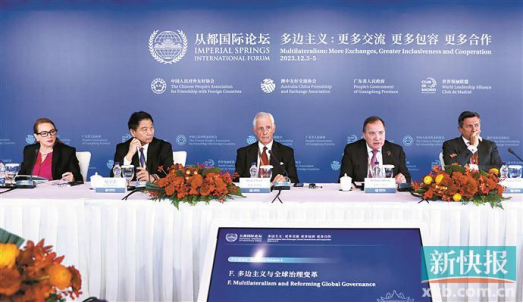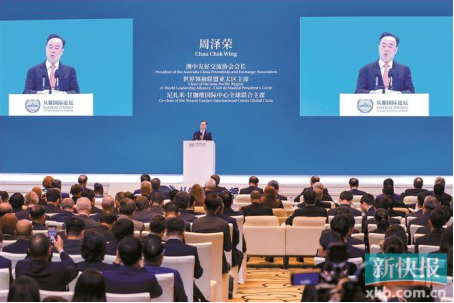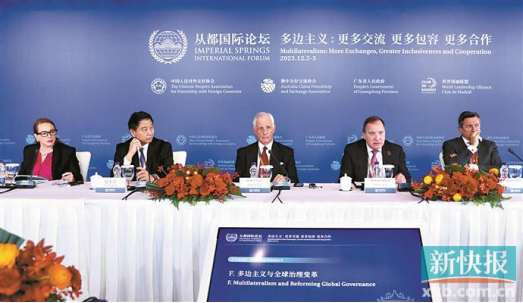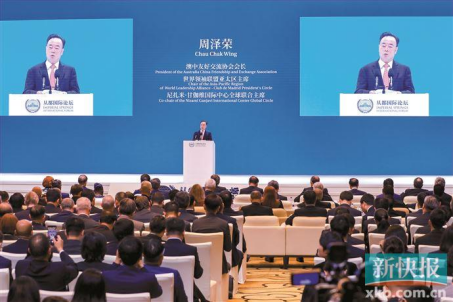
On December 5th, the 2023 Imperial Springs International Forum (ISIF) rounded off successfully in Guangzhou, where the "Imperial Springs Statement" was released. The statement points out that the ISIF explicitly proposes to "overcome fragmentation through exchanges, resolve antagonism through inclusiveness, and achieve a common future through cooperation". The international community should make joint efforts to address various global risks and challenges and jointly create a better future for the world.
At the closing ceremony, the Former President of Slovenia and President of World Leadership Alliance - Danilo Türk, expressed sincere gratitude to the organizers and hosts of the forum. He stated that since its establishment in 2014, the Imperial Springs International Forum has become an important platform for countries around the world to engage in in-depth dialogue and build universal consensus. During the forum, participants had rich and in-depth discussions, focusing on the multiple challenges and important issues that the world is facing, and shared their insightful views, contributing to governance wisdom. "I look forward to meeting everyone again at the ISIF next year and continue to work together to strengthen multilateralism and create a prosperous and stable world."
Vaira Vike-Freiberga, Former President of Latvia and Co-chair of the Nizami Ganjavi International Center, said the days at the ISIF created many fond memories. She said that the current international community faces multiple challenges, and countries also have differences in understanding international rules. The theme of the forum, "multilateralism", is a very important issue. Participants in the forum adhered to a common idea: multilateralism is crucial to the interests and survival of mankind. It should not be a broad concept, but a principle that needs to be implemented. In the future, all countries should join hands to respect the differences of civilizations, reserve space for exchanges and dialogue, and actively carry out multilateral cooperation.

On behalf of the organizers of the forum, Chau Chak Wing, President of the Australia China Friendship and Exchange Association and Chair of the Asia-Pacific Region, World Leadership Alliance, expresses sincere gratitude to all participants for their hard work. He said that during the two and a half days of the forum, there were 10 events, including the opening ceremony, closing ceremony, six breakout sessions, and exchange meetings. The participants had in-depth, extensive, and comprehensive exchanges on the forum's theme and topics, putting forward many good suggestions and ideas, further consolidating consensus, deepening friendship, enhancing trust, promoting cooperation, and achieving positive results.
What is multilateralism? In short, it means that international affairs are handled through collective consultation. During the forum, discussions on how to practice multilateralism, create a new global governance framework, and promote the well-being of human civilization have become hot topics among the guests.
Stefan Löfven, Former Prime Minister of Sweden, believes that the current geopolitical situation is becoming increasingly tense, and the international community cannot sit by and do nothing. The global community must work together to solve international issues. He mentioned that the primary principle of practicing multilateralism is to put people first. "The reform and construction of the global governance system should be open and transparent, focusing on climate issues and environmental friendliness, and ultimately benefiting people around the world." Secondly, we need to build a strong multilateral cooperation system, with regional international organizations such as ASEAN, the European Union, and Latin America actively participating in the construction of the multilateral system.
Yi Xiaozhun, Former Deputy Director-General of the WTO and Former China's Ambassador to the WTO, pointed out that the current economic globalization has encountered difficulties, and the rules-based global economic and trade governance order is collapsing, posing a serious threat to multilateral trade rules. In his view, in the face of a global crisis, no country can deal with it alone, and countries should not fall into the trap of protectionism. They must comply with economic globalization and take the initiative to shoulder their due responsibilities. "China unswervingly adheres to multilateralism and is committed to reshaping the global economic and trade governance system of co-governance, sharing and mutual benefits by strengthening multilateral cooperation," Yi Xiaozhun added.
"Our world has changed from the two poles of the past to the multipoles, but the governance thinking of the two poles is still lingering." Csaba Korosi, President of the United Nations 77th General Assembly, believes that everyone must face the problem frankly, that is, the multi-polar global governance system has not really been established. How can we transform faster to keep up with the times and build a truly effective global governance system? Csaba Korosi believes that it is necessary to build a new pattern of global governance within the framework of multilateral cooperation.
He also mentioned that under the mechanism of the United Nations Charter, the international community has established universal rules and consensus. In response to various global crises, it is necessary to revitalize the platform and mechanism of the United Nations to enable it to play a better role. Similarly, Volkan Bozkir, President of the United Nations 75th General Assembly, stated that the United Nations is at the core of the multilateral mechanism and should play a more important role in practicing and upholding the multilateral mechanism.
Sean Cleary, Executive Vice-Chair of the Future World Foundation, believes that global governance aims to enhance the well-being of human civilization. How to build an effective global governance system? He believes that effective reforms are needed, and more inclusiveness, mutual trust and exchanges are needed. The "three major initiatives" of China's Global Development Initiative, Global Security Initiative and Global Civilization Initiative have highly condensed the thinking of global governance and inspiration.
Voices:
Chau Chak Wing, President of the Australia China Friendship and Exchange Association and Chair of the Asia-Pacific Region, World Leadership Alliance:
During the forum, the participants closely focused on the theme, expressed their opinions, spoke freely, actively contributed their views and wisdom, and spoke highly of a platform for cooperation and exchanges provided by the Imperial Springs International Forum. Everyone agrees that in order to meet global challenges, all countries in the world should promote the common values of all mankind, safeguard and practice the new concept of true multilateralism and cooperation and common development of mutual benefits, strengthen cooperation, and jointly build a community with a shared future for mankind.

The more complex the international situation is, the more we need to strengthen communication, think from each other's perspective, and promote cooperation. People-to-people exchanges are flexible and diverse, covering a wide range of areas, and are full of vitality and hope. Since the establishment of the ISIF, we have made many sincere and good friends, who are very wise, well-connected, and have a broad vision. I deeply feel that they have a deeper and more comprehensive understanding of China and the world. We have always believed that confrontation brings no benefits, and cooperation and mutual benefits are the only choice.
Zlatko Lagumdzija, Former Prime Minister of Bosnia and Herzegovina Permanent Representative to the United Nations:
The Imperial Springs International Forum provides a platform for mutual learning and exchange, bringing together knowledgeable individuals from various sectors around the world. It encourages everyone to think and discuss global challenges, engage in more dialogues on key issues, and unite in embracing a common future through seeking common ground while reserving differences.
Borut Pahor, Former President of Slovenia:
The world is still not as peaceful as we imagine. To address global challenges, we need to be bold and wise enough to find ways to maintain global peace and stability. Thank you to Imperial Springs International Forum for providing us with a better opportunity for discussion and creating an atmosphere for reaching consensus on global governance.
Zhu Feng, Executive Dean of School of International Studies of Nanjing University:
Countries around the world should establish a common belief in solidarity and cooperation. The key is to listen to each other's opinions and ideas, learn from each other, and understand each other. This is also the concept advocated by the Imperial Springs International Forum.
“2023从都国际论坛”闭幕,《从都宣言》发布——以多边主义应对全球挑战 以合作共创美好未来
12月5日,“2023从都国际论坛”在广州闭幕并发表了《从都宣言》(2023)。宣言指出,“2023从都国际论坛”明确提出“要以交往超越封闭,以包容化解对立,以合作赢得未来”。国际社会应当共同努力,携手应对各种全球性风险和挑战,共同开创世界更加美好的未来。
闭幕式上,世界领袖联盟主席、斯洛文尼亚前总统达尼洛·图尔克对论坛的主办方、承办方表达了诚挚的感谢。他说,从都国际论坛自2014年创办以来,已成为世界各国深入开展对话、构建普遍共识的重要平台。论坛举办期间,与会嘉宾讨论丰富且深入,聚焦世界面临的多重挑战与亟待解决的重要问题,发表了真知灼见,贡献了治理智慧。“我期盼明年与大家在从都论坛相会,再次为夯实多边主义,继续创造一个繁荣、稳定的世界而努力。”
尼扎米·甘伽维国际中心共同主席、拉脱维亚前总统瓦伊拉·弗赖贝加说,在从都论坛的几天留下了许多美好的记忆。她表示,当前国际社会面临多重挑战,各国对于国际规则的理解也存有分歧,论坛聚焦的主题“多边主义”是一个十分重要的议题,与会嘉宾秉持了共同的理念:多边主义对人类的利益与生存至关重要,不应该是一个空泛的概念,而是一个需要落在实处的原则。未来,各国要共同携手,尊重文明的差异,保留交流对话的空间,积极开展多边合作。

澳中友好交流协会会长、世界领袖联盟亚太区主席周泽荣代表论坛主办方,向与会各方的辛勤付出表示衷心的感谢。他说,在两天半的会期内,论坛举办了开幕式、闭幕式、六场平行论坛、交流会等10场活动。围绕论坛主题、议题,与会嘉宾进行了深入、广泛、全面的交流,提出了许多好的建议、好的思路,进一步凝聚了共识,加深了友谊,增进了信任,推动了合作,起到了积极的成效。
多边主义是什么?简单来说,是国际上的事由大家共同商量着办。论坛举办期间,如何践行多边主义、打造全球治理新格局、增进人类文明福祉等成为嘉宾热议的话题。
瑞典前首相斯特凡·勒文认为,当前地缘政治局势紧张加剧,国际社会不能无动于衷坐以待毙,要携手合作解决国际问题。他谈到,践行多边主义的首要是坚持以人为本,“全球治理体系的改革与建设要公开、透明,要关注气候问题、环境友好问题,最终让改革效益惠及全球的人民。”其次,要打造强有力的多边合作体系,东盟、欧盟还有拉美等各地的区域国际组织,要广泛地参与到多边体系的建设中。
世贸组织原副总干事、原中国驻世贸组织大使易小准指出,当前经济全球化遭遇倒流逆风,以规则为基础的全球经贸治理秩序正在崩塌,对多边贸易规则构成严重威胁。在他看来,面对全球性的危机,没有一个国家能独善其身,各国不应当陷入贸易保护主义的误区,必须顺应经济全球化,主动担负起应有的责任。“中国坚持多边主义不动摇,通过加强多边合作,致力于重塑共治、共享、共赢的全球经贸治理体系。”易小准说。
“我们的世界从过去的两极变成多极,但两极世界的治理思维仍然挥之不去。”第77届联合国大会主席克勒希·乔鲍认为,大家必须坦诚地直面问题,即多极化的全球治理体系并未真正建立。如何更快地转型跟上时代,构建一个真正的、行之有效的全球治理体系?克勒希·乔鲍认为,一定要在多边合作的框架下去打造全球治理新格局。
他还提到,在联合国宪章的机制下,国际社会建立了普世的规则、共识。应对当前的各种全球危机,更要重振联合国的平台和机制,促使联合国更好地发挥作用。同样地,第75届联合国大会主席沃尔坎·博兹克尔表示,联合国是多边机制的核心,在践行和维护多边机制上,联合国应当发挥更重要的作用。
未来世界基金会执行副主席肖恩·克里瑞认为,全球治理的目的在于增进人类文明福祉。如何构建一个有效的全球治理体系?他认为需要进行有效的改革,需要更多的包容,更多的互信与更多的交流。而中国提出的全球发展倡议、全球安全倡议和全球文明倡议这“三大倡议”,高度凝练了全球治理的思想,从“三大倡议”可以得到思考与启发。
声音
论坛举办期间,与会嘉宾紧紧围绕主题,各抒己见,畅所欲言,积极贡献自己的观点和智慧,并对“从都国际论坛”提供的一个合作与交流的平台给予高度评价。大家一致认为,为应对全球性挑战,世界各国应弘扬全人类共同价值,维护和践行真正的多边主义与合作共赢、共同发展的新理念,加强团结合作,共同构建人类命运共同体。

国际形势越是复杂,越是需要加强交流,换位思考,包容合作。民间交往灵活多样,涉及面很广,充满活力和希望。从都国际论坛自创办以来,广交了一批好朋友、真朋友,他们非常有智慧,非常有人脉,非常有高度,我深切感受到他们对中国与世界的认识更深入、全面了。我们一直认为相互对立,没有好处,合作共赢才是唯一的选择。——澳中友好交流协会会长、世界领袖联盟亚太区主席周泽荣
从都国际论坛提供了一个互学互鉴的交流平台,汇聚了来自全球各地各界的有识之士,让大家就全球性挑战进行思考和讨论,在关键问题上进行更多的对话,在求同存异中团结起来拥抱共同未来。——波黑前总理、常驻联合国代表兹拉特科·拉古姆季亚
世界仍没有我们想象的那样太平。应对全球挑战,我们需要足够大胆、智慧,找到一些路径维护全球的和平与稳定。谢谢从都国际论坛,让我们有一个更好的讨论机会和讨论氛围,达成全球治理上的一些共识。——斯洛文尼亚前总统博鲁特·帕霍尔
世界各国要树立起同舟共济的共同信念,求同存异开展合作。关键是要互相倾听彼此的意见和想法,互相学习和相互了解。这也正是从都国际论坛所倡导的理念。——南京大学国际关系学院执行院长朱锋
文 | 记者 黄闻禹
图 | 记者 龚吉林
责编 |杨帆 王瑜瑛
-
Yan Juntao: the measurer certifies the Guangzhou Marathon
2023-12-07 23:01:39 -
Traditional Lingnan Style group wedding kicks off at Foshan Ancient Town
2023-12-07 23:00:01 -
Global media witness a progressing China at the World Media Summit in Guangzhou and Kunming
2023-12-07 23:01:17 -
Video|Quick Takeaway 3 Conferences in 4 Key Words
2023-12-07 10:20:39






